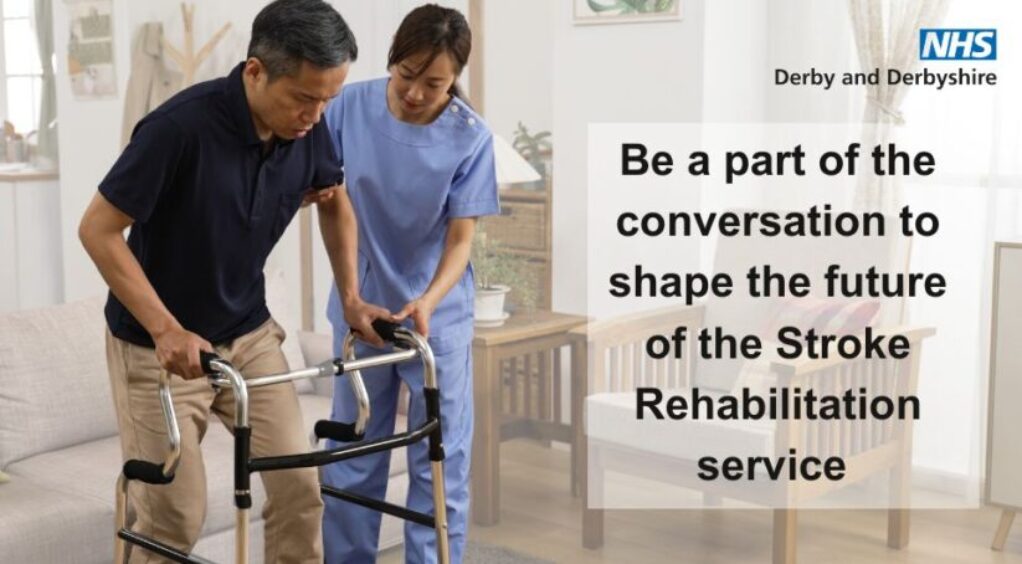Have your say on stroke rehabilitation services
People across Derby and Derbyshire are being invited to have their say over services that help with recovery from a stroke.
Services are currently different, depending on where you live.
Additionally, services are very busy and demand is growing. There has been a 6% increase in stroke admissions to Derbyshire hospitals since 2021/22.
Rehabilitation can help stroke survivors live well and reduce subsequent hospital visits, but services in Derbyshire are mixed.
There are four types of treatment following a stroke:
- Early supported stroke discharge, which is a six week programme for those with mild to moderate disabilities. This helps 40% of stroke patients, helping them to get care at home, improve independence, and reduce hospital stays. This service is available over all of Derbyshire except the High Peak area.
- Community stroke rehabilitation, which is for patients with more severe strokes or those needing longer term support.
- Hospital outpatient support, for example with physiotherapy, occupational therapy and psychological support.
- “Life after stroke” specialised support provided by the Stroke Association. A “stroke navigator” service for general support is provided in North Derbyshire, communications support is provided in South Derbyshire and Derby city, and different personalised support is also provided in Glossop and the surrounding area.
National best practice is for stroke rehabilitation services to be provided through an integrated service that ensures all discharged stroke patients are seen in a timely way by an integrated multidisciplinary team, regardless of their disability.
NHS Derby and Derbyshire Integrated Care Board has begun a “pre-engagement” listening exercise to hear the views of people affected by stroke, as well as their carers, families and friends.
Dr Chris Weiner, NHS Derby and Derbyshire Integrated Care Board chief medical officer, said: “We know that people who are supported with appropriate rehabilitation following a stroke will see their health and recovery improve better than people who don’t get the right support.
“People in Derby or Derbyshire are currently receiving different services, depending on where they live, and as a result some are put at a disadvantage.
“We want to change that. But to change services for the better we want to hear about people’s experiences of stroke rehabilitation.
“So please go along to one of our events, or you can give your views through our survey.”
John Hinchcliffe, aged 81, from Dronfield, had strokes in 2021 and 2023.
He said: “I had a very good experience of rehabilitation and I want to help ensure that all future stroke patients in Derbyshire have that good experience too.
“When I came out of hospital after my first stroke I wasn’t even able to dress myself.
“The occupational therapist on the supported early discharge team showed me how to do that and that was a big psychological boost.
“I have my mobility back, my speech is fine, I’m driving again and I’m doing really well apart from some ongoing problems with my left hand.
“Rehabilitation started while I was in hospital. Then I had six weeks of early support after discharge, followed by months of physiotherapy and occupational therapy with the community neuro team.
“I’m also a member of Chesterfield Stroke Group. The peer support they provide is also really important for recovery.”
Jonathan Clark, a 48-year-old sales manager who lives in Dronfield, had a stroke in September 2022.
He said: “It came out of the blue. I had no pain beforehand and there is no history of stroke in my family, but I had a massive stroke.
“I was taken to Chesterfield Royal Hospital where I spent one night before going home.
“I had some speech and language therapy, but I was keen to get back to normality and I went back to work after five weeks.
“My employers were supportive, but I’m not the same person I was. Looking back now I can see I would have benefited from more support. My wife also needs support because she has to do things for me now.”
Jonathan’s wife Maria added: “Jonathan’s GP supported him in the early weeks following his stroke until he was offered the early supported discharge package.
“He then received speech therapy, occupational therapy and psychological support.
“No one ever expects to have a stroke, especially in their 40s, so as a patient or carer you don’t know what services are there for you. It’s really important you get that advice and support in a timely way.
“I would encourage other stroke survivors and their carers to come forward and have their say about how services should be designed to meet their needs so that those who sadly walk this path behind us get the care and support they may need at the time that they most need it.”
People contributing to the pre-engagement development and design include patient representatives, carers groups, service providers, the Stroke Association charity and the support charity Different Strokes.
Public workshops have been arranged in Derby (5 November), Belper (5 November), Glossop (12 November), Chesterfield (13 November) and Buxton (14 November).
People can also have their say via a survey, by phone on 01332 981601, or via online workshops on 22 and 24 October.
Full details are on the Derby and Derbyshire Involvement website.

